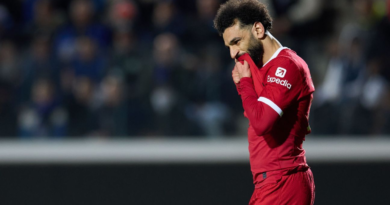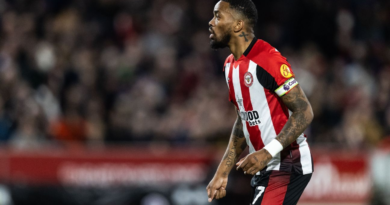10 questions on the No. 1 pick in the NFL draft
There’s just one more week to the 2022 NFL season, and two teams are still in the running for the No. 1 overall pick in the 2023 draft. Will it be the Houston Texans (2-13-1) or Chicago Bears (3-13) when the dust settles Sunday? And which top prospect might each team target as the first player off the board?
After a down year for quarterback prospects — there was just one selected in the first two rounds last April — there are at least three who could go first off the board this year. And beyond the signal-callers, there are multiple elite defenders who can stake a claim to being the best overall prospect in the class and potentially be the first player taken.
We pitched 10 questions to NFL draft analyst Jordan Reid, Texans reporter DJ Bien-Aime, Bears reporter Courtney Cronin and analytics writer Seth Walder to sort through how it could all play out April 27, including what to know about the race for No. 1 and which prospects could be the top selection. Be sure to check out Reid’s new Round 1 mock draft to see his projected picks for both teams. Let’s dig in.

Are the Texans or Bears more likely to claim the top pick?
Walder: The Texans. Houston having a slightly worse record going into the final week is a hefty advantage, but the race is closer than you might think because it plays the Colts. ESPN’s Football Power Index (FPI) is more confident in the Texans winning in Week 18 (66.7%) than it has been heading into any other Houston game this season. As a result, FPI makes it a narrow favorite — 55.7% to Chicago’s 44.3% — to earn the top pick.
Houston can clinch with either a loss or tie against Indianapolis or a Chicago win or tie against Minnesota. Chicago, meanwhile, needs a loss and Texans win to slide into the top spot. Houston has the tiebreaker in the unlikely event that both teams finish with the same winning percentage.
How’d the Texans end up here? And are they sure Davis Mills is not their guy at QB?
Bien-Aime: Houston has struggled across the board, with its 4.7 yards per play ranking last in the league and 5.7 yards allowed per play sitting at 24th. Its nine-game losing streak in the middle of the season was tied for the second-longest in franchise history, behind a 14-game stint in 2013. And the team really struggled to close out games, too. In five of the Texans’ 13 losses, they either led or were tied after the third quarter. That isn’t going to get it done.
And yes, quarterback play hasn’t been where it needs to be to win, and it’s clear Mills is not the Texans’ long-term answer — especially since they at one point benched him for Kyle Allen and have leaned more on Jeff Driskel in a two-QB system down the stretch. The offense has averaged only 16.1 points (31st), and Mills has thrown 13 interceptions over 14 starts. His 32.9 QBR ranks 30th out of 31 qualifying quarterbacks, ahead of only Baker Mayfield.
Mills is a solid NFL backup, but he isn’t a long-term starter the Texans can build around. They need to explore other options this spring.
So then it’s quarterback or bust for the Texans with their top pick?
Bien-Aime: Absolutely. The Texans not having an answer at the position is a major reason they’re picking this high, and this should be a strong class to find their guy. Over the past two seasons, Houston ranks 31st in QBR (33.7) and 32nd in yards per dropback (5.5), and this is an excellent chance to drastically improve the outlook of the position. Simply put, the Texans’ rebuild can’t reach its ceiling if there’s no stability at the position.
Something else to consider: Houston also needs some juice and energy. The stadium is half empty during games, and the Texans need a player to reenergize the fan base. A future star quarterback could do that.
Who are the quarterbacks that could go No. 1?
Reid: There are three who truly have a shot, and each has his own unique skill set.
First, there’s Bryce Young of Alabama, who declared for the draft after the Crimson Tide won their bowl game. Listed at 6-foot and 194 pounds, Young is smaller than the other two, but he has all of the other ingredients necessary to become a high-end passer at the next level. One of the better parts of his game is his ability to diagnose and attack weak spots in defenses with either his arm or his legs. He has outstanding poise and plays the game with the same heartbeat no matter the magnitude of the situation.
Then there is Ohio State’s C.J. Stroud, a traditional pocket passer who can see it, read it and execute any throw. When in rhythm, he’s a point guard who can distribute the ball accurately in a timely manner. The 6-foot-3, 218-pound Stroud displays clean footwork and good body mechanics, but he needs to show more as a creator when plays are knocked off schedule.
And finally, we have Kentucky passer Will Levis. At 6-foot-3 and 232 pounds, he has the kind of frame that NFL teams covet, and the Wildcats’ offense gave him a lot of experience with pro-style offensive concepts, including play-action and experience from both under center and out of the shotgun. The ball comes off his hand with a ton of velocity, too, as Levis can deliver it where it needs to go even when his feet aren’t properly set. But his turnover woes are concerning. He had at least one in all but three games this season and threw 10 interceptions.
Which of them is the best fit for Houston?
Reid: Young. He has been my QB1 since the summer, and I don’t see anything changing. Houston is still rebuilding this roster with young talent, but general manager Nick Caserio has some young building blocks in place and two first-round picks in each of the next two drafts.
The Texans clearly lack an identity, and that “face of the franchise”-type player still hasn’t surfaced. Young would immediately change everything, giving the team an instant jolt of excitement. He can make all the throws and has found success no matter the supporting cast. Plus, he already knows one of their young players, having connected with John Metchie III 96 times at Alabama last season. Metchie, Houston’s second-round pick last April, missed the season while being treated for leukemia, but he is expected to be ready to play in 2023.
The Texans also have a second Round 1 pick, courtesy of the Browns. What’s their biggest need outside of QB?
Bien-Aime: There are a lot of weaknesses here — after all, Houston has just two wins — but the interior offensive line is probably their biggest need. Their combo of right guard A.J. Cann, center Scott Quessenberry and left guard Kenyon Green has given up 22 sacks.
But that’s not a position you’ll see this early in the draft (currently projected to be No. 12, per ESPN’s FPI), so I’d expect Houston to add a difference-maker at a premium offensive position. Receiver Brandin Cooks leads the team with 593 receiving yards, and no one has more TD catches than tight end Jordan Akins‘ three. The Texans need to get their new QB some help!
OK, and how about the Bears? How did they end up here despite Justin Fields‘ breakout?
Cronin: Yes, they have been better, but the talent surrounding Fields has been Chicago’s pitfall. The Bears have the league’s worst passing offense and don’t have a single player with at least 500 receiving yards. Defensively, they rank 29th in run defense (5.0 yards allowed per rush), and no team gives up more points than their 27.1 per game average. Their Week 17 loss was their ninth straight, the longest losing streak in franchise history.
This team was not built to see success in the form of wins in 2022, and general manager Ryan Poles began a roster teardown at midseason by trading linebacker Roquan Smith to Baltimore. The Bears, however, are now in a position to add aggressively via free agency — they have north of $110 million in salary cap space in 2023 — and the draft, and they already checked their biggest and most important box by figuring out Fields is the quarterback to build around.
Unlike Houston, Chicago wouldn’t be looking at QB with this pick. What is the Bears’ top priority atop the draft?
Cronin: Building around Fields on offense is critical, but the Bears can’t really do that at No. 1 or No. 2 based on positional value. Georgia defensive tackle Jalen Carter could instead be an option because 3-technique is the most important position in Matt Eberflus’ defense. The Bears have not shown an ability to pressure opposing quarterbacks (22% of opponent dropbacks, 31st in the NFL) or stop the run. Drafting someone like Carter begins to solve both of those issues.
Offensive line and wide receiver are also among this team’s biggest needs. Outside of wideouts Darnell Mooney, Chase Claypool and rookie Velus Jones Jr., who can the Bears say for certain is on their roster next year at the position?
Who are the non-QB prospects who could go No. 1 if the Bears are picking there?
Reid: How about Alabama edge rusher Will Anderson Jr.? The 6-foot-4, 243-pounder has 27.5 sacks, 54 tackles for loss and 129 pressures over the past two seasons. Just consider that the Bears’ leader in sacks this season is safety Jaquan Brisker (four), and it’s obvious this team needs help in that area. Anderson would give the team a dependable threat off the edge who could turn into a potential franchise centerpiece. His combination of pass-rush savviness, heavy hands and explosiveness really stands out on tape.
Courtney also mentioned Carter, and Eberflus is on record saying that 3-technique is the “engine that makes everything go” in his defense. At 6-foot-3 and 300 pounds, Carter’s explosiveness and penetrating ability would be a welcome addition.
Teams will be looking to move up the board for a QB. Would a trade down be in play for Chicago?
Cronin: Absolutely. Chicago doesn’t have a need at quarterback, so it would be in prime position to take the best trade package available and move back from No. 1 (or No. 2) while still being able to draft a top defensive player. The Bears might not want to move down too far, given Carter and Anderson won’t be available for long, but there should be options there.
If Houston falls to No. 2 and has its eyes set on drafting a particular passer, it might be willing pay a steep price to move to No. 1 to ensure that happens and block another team.Teams such as Seattle, Indianapolis, Detroit, Las Vegas, Atlanta and Carolina could also all be in the mix to offer up a big package to get their guy.



